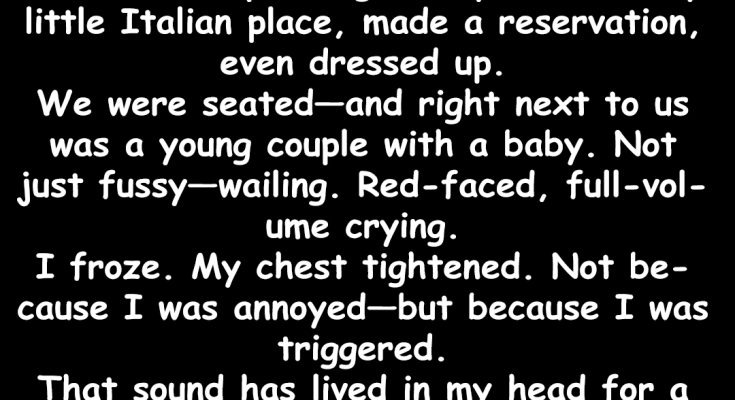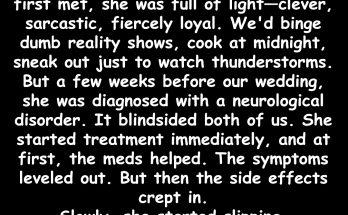The screaming reminded me of 2 a.m. feedings—and I just wanted one hour to feel like myself again.
It was our first dinner out in months. My second baby, his first, and we were finally brave enough to leave the house without a diaper bag. We picked a cozy little Italian place, made a reservation, even dressed up.
We were seated—and right next to us was a young couple with a baby. Not just fussy—wailing. Red-faced, full-volume crying.
I froze. My chest tightened. Not because I was annoyed—but because I was triggered.
That sound has lived in my head for a year. Through postpartum, through sleepless nights, through moments I didn’t recognize my own reflection. And now, on this one rare night I get to be me—it’s back.
So I gently asked the waiter if we could move tables. Quietly. No eye-rolling. No dramatic sighs.
He nodded and said it was no problem.
But as we stood up, the baby’s mom hissed under her breath, “Must be nice to act like your kids don’t cry.”
I turned to her, stunned.
And just as I opened my mouth to explain—my husband touched my hand.
“Don’t,” he whispered, with a small shake of his head. “It’s not worth it.”
But something in me cracked.
I wasn’t angry. Not exactly. It was more like this aching need to be understood. Because I knew that look she gave me. The exhaustion behind it. The cracked pride.
“I wasn’t judging you,” I said, softly. “I have two. The youngest is still in diapers. I just needed a break from the sound. That’s all.”
She looked at me like she didn’t know whether to cry or curse me out.
Her partner—maybe husband, maybe boyfriend—looked just as defeated. He was bouncing the baby on his knee, looking at the menu with one hand like he was trying to pretend this was normal.
“We haven’t eaten out since she was born,” the mom said. “We thought it’d be fine if we just came early. She never cries like this.”
I nodded. “Yeah. They never do. Until they do.”
There was a beat. Her eyes softened just a little. My husband gave me a small smile, like he was proud of me for not snapping.
We moved tables.
I thought that would be the end of it.
But halfway through the main course—fettuccine alfredo, still hot for once—I noticed the couple packing up. The baby was still crying. The dad had barely touched his food. The mom looked utterly defeated.
They were leaving.
I watched them from across the restaurant. Something in me tugged hard.
“I’ll be right back,” I told my husband, setting down my fork.
I walked over to their table, gently.
“Hey,” I said. “Would you like to switch with us?”
They blinked at me like I had three heads.
“Our table is tucked in the corner, near the kitchen,” I explained. “It’s louder over there. No one will hear her cry as much. It might give you a little more peace.”
The dad looked at me, then at the mom. The mom’s eyes welled up.
“You’d really do that?”
I nodded. “Of course. We’re parents. We help each other out.”
So we switched back. My husband laughed when I returned.
“You just gave up the quiet corner,” he teased.
“Worth it,” I said. “They need it more.”
But here’s where the night really turned.
After dessert—tiramisu and espresso—we were getting ready to leave when the waiter came over.
“Your check’s been covered,” he said.
I blinked. “What?”
He pointed. “The couple with the baby. They insisted.”
My husband and I exchanged a look. Then we looked over at the couple. The baby was finally asleep in the mom’s arms. She gave me a little smile and mouthed, “Thank you.”
It warmed something in me I didn’t even know was cold.
We stepped outside into the summer night, the sky streaked in lavender and gold. I took a deep breath.
It wasn’t the night I imagined. But maybe it was the night I needed.
Still, the next day, the story didn’t end there.
That afternoon, I took the kids to the park. I was sitting on a bench, trying to entertain my toddler while breastfeeding the baby under a loose cover, when a woman walked up to me.
“You were at Sorella’s last night,” she said.
I looked up, confused.
She smiled. “I was sitting near the kitchen. I saw what you did. Switching tables like that. That was really kind.”
I laughed awkwardly. “Oh—it was nothing, really.”
She shook her head. “No, it wasn’t. That mom was in tears in the restroom earlier. She said she felt like a failure until you came over.”
That sat with me. Long after she left.
Because I had felt like a failure many nights. Still did, often. And yet—maybe that’s the very reason we’re able to recognize it in others.
That moment became a strange turning point.
I started noticing other moms more. The ones struggling with strollers through narrow doors. The ones chasing toddlers in grocery store aisles. The ones with tired eyes at the pharmacy counter, asking if the pediatric cough syrup was in stock.
And slowly, something shifted in me. I stopped apologizing for needing help. And I stopped hesitating when I saw someone else who did.
A few weeks later, I bumped into the couple from the restaurant again. At Target, of all places. Their baby was asleep in the carrier, and they were arguing over diaper brands.
We laughed. Talked for a while. And then exchanged numbers.
Since then, we’ve had coffee twice. Our babies drool together on play mats while we talk about everything from sleep training to marriage therapy. They’re good people. Real. Honest.
But here’s the twist I never saw coming.
One night, after the kids were in bed, my husband looked at me across the kitchen table and said, “I think I want to stay home.”
I blinked. “What do you mean?”
“I want to take paternity leave,” he said. “For real. Not just a week off. I want to do what you did.”
At first, I didn’t know what to say.
He’d always been a great dad—but he never really understood the weight of it all. The days that blur into nights. The isolation. The invisible work.
But after that dinner? After watching me balance all those emotions and still choose kindness?
He saw it differently.
So he took three months off. Became the main caregiver. Let me go back to part-time freelancing. Let me breathe.
And that changed everything in our marriage.
I felt like me again.
It all started with one ruined dinner. One crying baby. One choice to not walk away angry.
Looking back now, I think we expect parenting to isolate us. To box us into our homes, routines, and exhaustion. But it doesn’t have to.
Sometimes, it’s in the small gestures—switching tables, smiling in a checkout line, answering a tired mom’s question with patience—that the most human parts of us survive.
Not every day is easy. My youngest still doesn’t sleep through the night. But now, when I hear a baby cry in public, I don’t flinch.
I look around, and I wonder: Who needs to know they’re not alone today?
Because maybe the most important lesson parenthood has taught me is this—
No one makes it through without a village. Sometimes, you build it. One kind act at a time.
If this story warmed your heart, made you smile, or reminded you of a moment when someone showed up for you—please like, share, and let others feel a little less alone today.
You never know who might need it.

